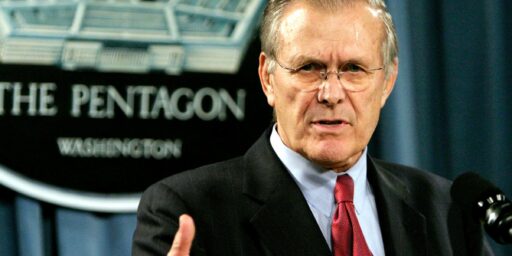Powell Destroyed?
Fred Kaplan has a piece in Slate entitled, “The Tragedy of Colin Powell — How the Bush presidency destroyed him.”
As George Bush’s first term nears its end, Powell’s tenure as top diplomat is approaching its nadir. On the high-profile issues of the day, he seems to have almost no influence within the administration. And his fateful briefing one year ago before the U.N. Security Council—where he attached his personal credibility to claims of Iraqi WMD—has destroyed his once-considerable standing with the Democrats, not to mention our European allies, most of the United Nations, and the media.
At times, Powell has taken his fate with resigned humor. Hendrik Hertzberg wrote in The New Yorker last year of a diplomatic soiree that Powell attended on the eve of war, at which a foreign diplomat recited a news account that Bush was sleeping like a baby. Powell reportedly replied, “I’m sleeping like a baby, too. Every two hours, I wake up, screaming.”
At other times, though, Powell must be frustrated beyond measure. One can imagine the scoldings he takes from liberal friends for playing “good soldier” in an administration that’s treated him so shabbily and that’s rejected his advice so brazenly. That senseless dressing-down of the committee staffer—a tantrum that no one with real power would ever indulge in—can best be seen as a rare public venting of Powell’s maddened mood.
The decline of Powell’s fortunes is a tragic tale of politics: so much ambition derailed, so much accomplishment nullified.
This assessment is rather bizarre in that, as best I can tell, not only is Powell not destroyed but he’s also been rather influential within the Administration. Indeed, the example Kaplan chooses to use–using the WMD argument to rally the UN–was Powell’s idea. The neocons, correctly it turns out, thought going to the UN was a waste of time. Powell persuaded President Bush that it was worth eating a little crow to get the backing of the international community. It was the need to make an argument grounded in international law rather than US interests that shifted the focus of the debate from “regime change” to WMD. That was clearly a mistake.
Kaplan gives some better examples later in the piece:
Once the invasion got under way, the principles of warfare that he’d enunciated as a general—the need to apply overwhelming force on the battlefield (which, during the last Gulf War, was dubbed the “Powell Doctrine”)—were harshly rejected (and, in this case, rightly so—Rumsfeld’s plan to invade with lighter, more agile forces was a stunning success, at least in the battlefield phase of the war). Powell’s objections to Ariel Sharon’s departure from the Israeli-Palestinian “road map” were overridden by a White House where Eliot Abrams had been put in charge of Middle East policy. Powell’s statements on the Middle East came to be so widely ignored—because no one saw them as reflecting U.S. policy—that Bush sent Condoleezza Rice to the region when he wanted to send a message that would be taken seriously. When Bush dispatched an emissary to Western Europe after the war to lobby for Iraqi debt-cancellation and make overtures for renewing alliances, he picked not Powell but James Baker, the Bush family’s longtime friend and his father’s secretary of state.
Ian Bremmer, president of the Eurasia Group, a political risk-assessment firm, notes that Powell has scored significant policy achievements on China, Georgia, and the India-Pakistan dispute. But these are issues over which neither Cheney nor Rumsfeld has much at stake—politically, ideologically, or financially.
There have also been occasions, on higher-profile topics, when Powell has broken through the barricades and advanced his positions. He (and Condi Rice) persuaded Bush, over Rumsfeld’s opposition, to implement the U.S.-Russian accord reducing strategic missiles. However, he couldn’t stop the president from pulling out of the Anti-Ballistic-Missile Treaty.
This doesn’t strike me as particularly unusual, though. The Secretary of State is merely a plenipotentiary who implements the policies of his boss, the president. That Bush would often disagree with Powell was hardly unexpected.






excellent points James
“This assessment is rather bizarre in that, as best I can tell, not only is Powell not destroyed but he’s also been rather influential within the Administration.”
You have to remember, Kaplan’s in a bind: he has to be nice to Powell because Powell’s African-American, yet be dismissive of Powell because Powell’s a Republican. Thus, he turns Powell into a victim of the evil, evil Bush administration – and can now handily recast Powell’s dressing down of an insolent Democratic staffer as a minor, stress-related breakdown instead of the righteous smackdown that it was.
Or something like that. 🙂